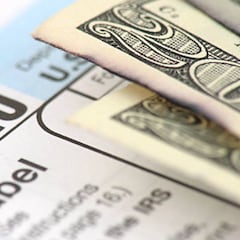5 tips to reduce your state tax bill in New York
Residents of the Empire State face some of the highest taxes in the United States. However, there are five ways to lighten your tax burden. Here’s a look.

New York is an attractive destination for many, either to visit or to settle down. However, it has one unenviable feature, some of the highest taxes in the United States.
Between combined state and city income tax, property tax and other levies imposed upon residents, New Yorkers face a daunting task preparing their declaration and potentially a hefty bill each tax season. However, there are ways to possibly lighten your tax burden in the Empire State.
What are the top ways to lower your NY State tax bill?
Contribute to an IRA or similar retirement account
Contributions to retirement accounts such as 401(k) plans, IRAs, or self-employed retirement plans can lower your taxable income, reducing your tax liability. For the year 2023, you are allowed contributions of up to $19,500 to your 401(k) plan.
Additionally, New York State offers tax deductions for contributions to certain retirement plans.
READ ALSO: Deadlines to keep in mind as tax season comes to an end
Income tax filing season is in full swing! To help you navigate your return, check out our income tax filing resource center. It has everything you need, from information on getting ready to free e-file options. Learn more and file today: https://t.co/IMHRon7EKv pic.twitter.com/mFJPW2lpeq
— NYS Tax Dept (@NYSTaxDept) March 14, 2024
Take advantage of tax credits
Tax credits can directly reduce your tax liability. New York State offers various tax credits, such as the Earned Income Tax Credit (EITC), Child and Dependent Care Credit, and Empire State Child Credit, which can help lower your overall tax bill. Full- or part-year New York City residents can also receive several income tax credits.
For financially distressed taxpayers, the state has the Offer in Compromise program which allows qualified filers to cope with staggering tax liability by paying a reasonable part of their tax debt.
READ ALSO: Do senior citizens on Social Security have to file taxes?
Still need to file your taxes? Starting today, you can file them online for free using New York’s new Direct File tool!
— Governor Kathy Hochul (@GovKathyHochul) March 12, 2024
Learn more and check if you’re eligible: https://t.co/R03dE7QYFV pic.twitter.com/juAAO7OkPQ
Maximize education tax benefits
If you or your dependents are pursuing higher education, consider taking advantage of education-related tax benefits such as the New York State 529 College Savings Program and the American Opportunity Tax Credit
Contributions to a New York 529 plan can reduce your state taxable income by up to $5,000 for individual filers and $10,000 for married couples filing jointly.
Itemize deductions
If your itemized deductions exceed the standard deduction, you may be able to lower your tax bill by itemizing deductions such as mortgage interest, property taxes, charitable contributions, and medical expenses. New York residents have an added incentive to itemize their state and local taxes as this can result in deductions for sizable state and local taxes.
Invest in real estate
As mentioned above, New Yorkers can deduct mortgage interest and property taxes when they itemize them on their tax bill. Investing in real estate can be not only strategic for building wealth but also a way to get income while reducing your tax bill at the same time.
Related stories
Expenses for maintenance and repairs as well as depreciation on rental properties can be used to offset income from the rent and at the same time reduce taxable income.
In order to maximize the potential deductions that you may be able to access and avoid any pitfalls, it is always recommendable to speak to a trusted financial advisor who can guide you through the process.


Complete your personal details to comment